Analysis of HRM Issues, Trends, and Policies in Hospitality (Sofitel)
VerifiedAdded on 2022/12/26
|18
|5132
|176
Report
AI Summary
This report provides a comprehensive analysis of Human Resource Management (HRM) issues and trends within the hospitality industry, specifically focusing on Sofitel Hotels and Resorts. It begins by identifying contemporary challenges such as low employee morale, increased harassment cases, theft, and inexperienced management. The report then explores emerging HRM trends, including talent identification, personalized employee engagement, healthcare benefits, POSH training, and recognizing high-performing individuals. The main body delves into designing job descriptions and person specifications for management positions, using a Bar Manager role as an example. It further examines performance management processes to minimize staff turnover, identify training needs, and enhance promotions. Finally, the report critically analyzes two key HR policies: Training Management and Talent Management, offering insights into their effectiveness and potential improvements. The report concludes with a summary of findings and recommendations for improving HRM practices within the hospitality sector.
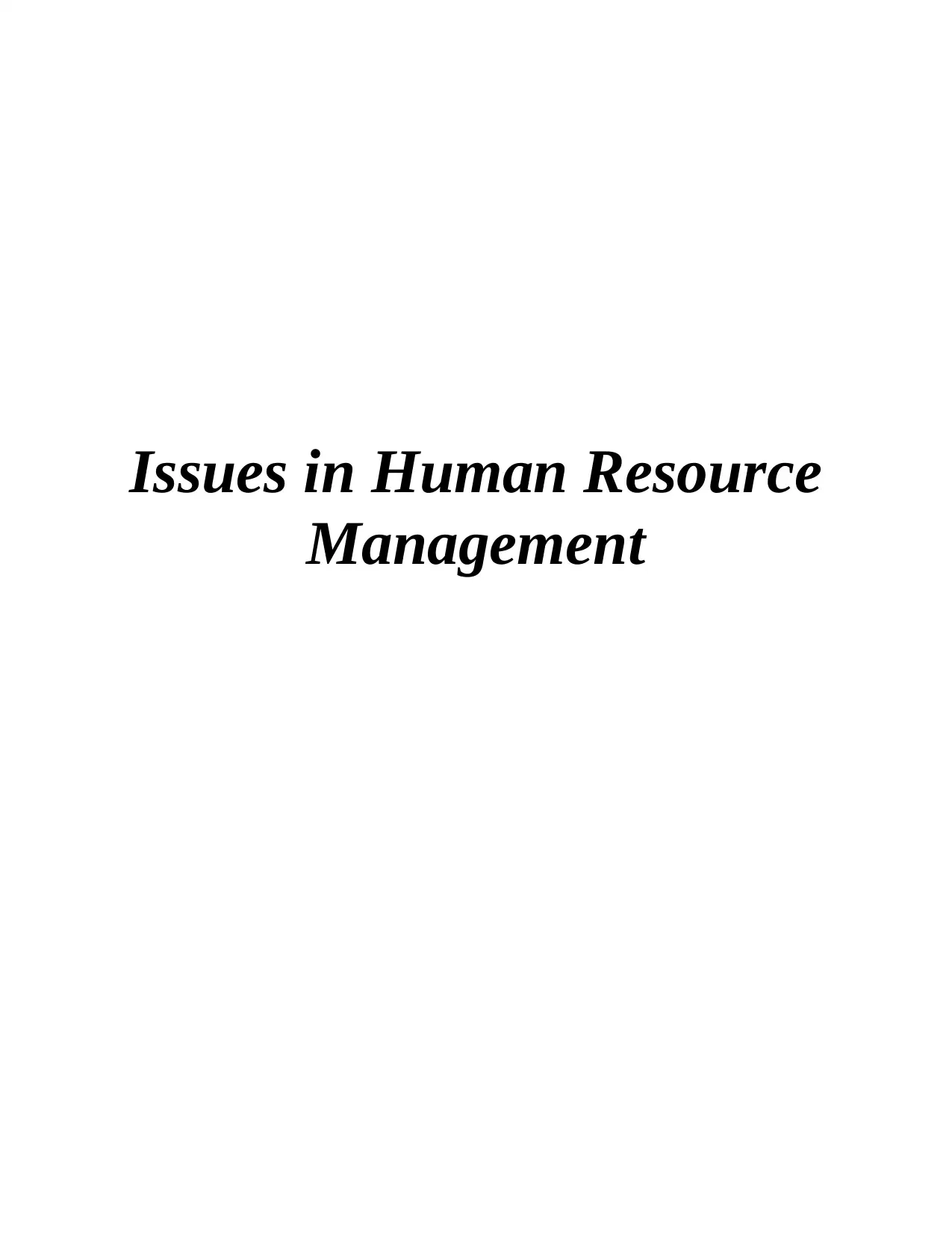
Issues in Human Resource
Management
Management
Paraphrase This Document
Need a fresh take? Get an instant paraphrase of this document with our AI Paraphraser
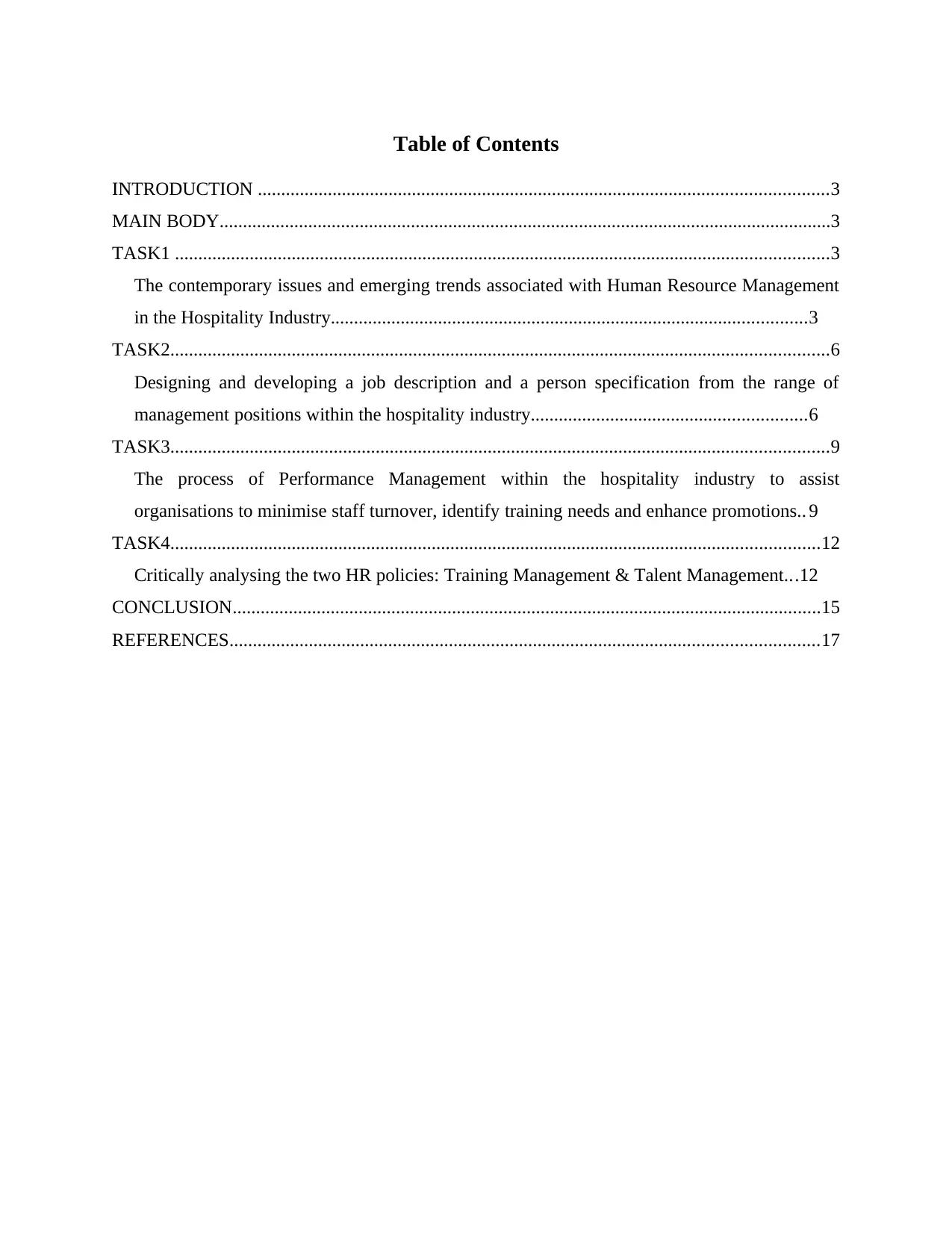
Table of Contents
INTRODUCTION ..........................................................................................................................3
MAIN BODY...................................................................................................................................3
TASK1 ............................................................................................................................................3
The contemporary issues and emerging trends associated with Human Resource Management
in the Hospitality Industry......................................................................................................3
TASK2.............................................................................................................................................6
Designing and developing a job description and a person specification from the range of
management positions within the hospitality industry...........................................................6
TASK3.............................................................................................................................................9
The process of Performance Management within the hospitality industry to assist
organisations to minimise staff turnover, identify training needs and enhance promotions.. 9
TASK4...........................................................................................................................................12
Critically analysing the two HR policies: Training Management & Talent Management...12
CONCLUSION..............................................................................................................................15
REFERENCES..............................................................................................................................17
INTRODUCTION ..........................................................................................................................3
MAIN BODY...................................................................................................................................3
TASK1 ............................................................................................................................................3
The contemporary issues and emerging trends associated with Human Resource Management
in the Hospitality Industry......................................................................................................3
TASK2.............................................................................................................................................6
Designing and developing a job description and a person specification from the range of
management positions within the hospitality industry...........................................................6
TASK3.............................................................................................................................................9
The process of Performance Management within the hospitality industry to assist
organisations to minimise staff turnover, identify training needs and enhance promotions.. 9
TASK4...........................................................................................................................................12
Critically analysing the two HR policies: Training Management & Talent Management...12
CONCLUSION..............................................................................................................................15
REFERENCES..............................................................................................................................17
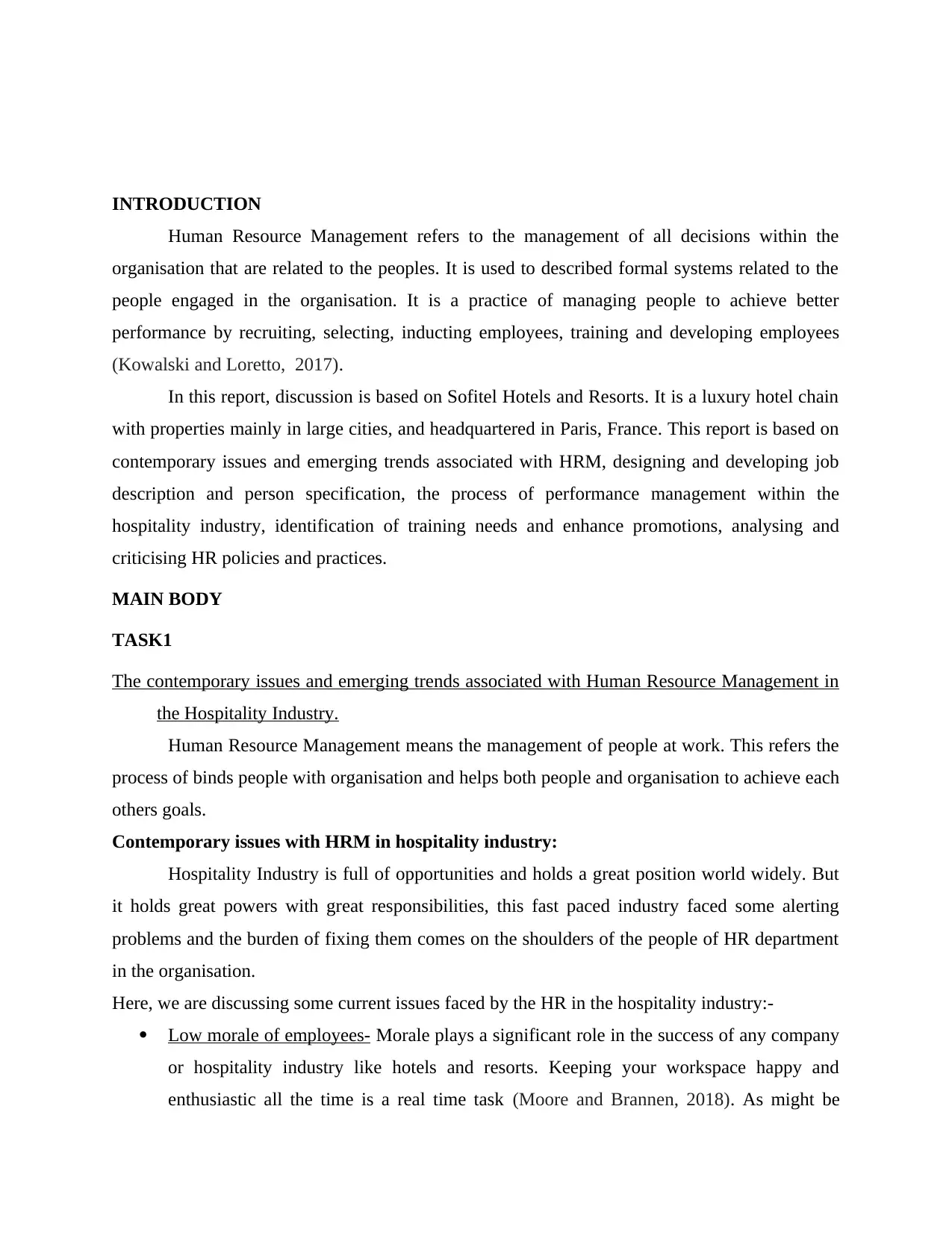
INTRODUCTION
Human Resource Management refers to the management of all decisions within the
organisation that are related to the peoples. It is used to described formal systems related to the
people engaged in the organisation. It is a practice of managing people to achieve better
performance by recruiting, selecting, inducting employees, training and developing employees
(Kowalski and Loretto, 2017).
In this report, discussion is based on Sofitel Hotels and Resorts. It is a luxury hotel chain
with properties mainly in large cities, and headquartered in Paris, France. This report is based on
contemporary issues and emerging trends associated with HRM, designing and developing job
description and person specification, the process of performance management within the
hospitality industry, identification of training needs and enhance promotions, analysing and
criticising HR policies and practices.
MAIN BODY
TASK1
The contemporary issues and emerging trends associated with Human Resource Management in
the Hospitality Industry.
Human Resource Management means the management of people at work. This refers the
process of binds people with organisation and helps both people and organisation to achieve each
others goals.
Contemporary issues with HRM in hospitality industry:
Hospitality Industry is full of opportunities and holds a great position world widely. But
it holds great powers with great responsibilities, this fast paced industry faced some alerting
problems and the burden of fixing them comes on the shoulders of the people of HR department
in the organisation.
Here, we are discussing some current issues faced by the HR in the hospitality industry:-
Low morale of employees- Morale plays a significant role in the success of any company
or hospitality industry like hotels and resorts. Keeping your workspace happy and
enthusiastic all the time is a real time task (Moore and Brannen, 2018). As might be
Human Resource Management refers to the management of all decisions within the
organisation that are related to the peoples. It is used to described formal systems related to the
people engaged in the organisation. It is a practice of managing people to achieve better
performance by recruiting, selecting, inducting employees, training and developing employees
(Kowalski and Loretto, 2017).
In this report, discussion is based on Sofitel Hotels and Resorts. It is a luxury hotel chain
with properties mainly in large cities, and headquartered in Paris, France. This report is based on
contemporary issues and emerging trends associated with HRM, designing and developing job
description and person specification, the process of performance management within the
hospitality industry, identification of training needs and enhance promotions, analysing and
criticising HR policies and practices.
MAIN BODY
TASK1
The contemporary issues and emerging trends associated with Human Resource Management in
the Hospitality Industry.
Human Resource Management means the management of people at work. This refers the
process of binds people with organisation and helps both people and organisation to achieve each
others goals.
Contemporary issues with HRM in hospitality industry:
Hospitality Industry is full of opportunities and holds a great position world widely. But
it holds great powers with great responsibilities, this fast paced industry faced some alerting
problems and the burden of fixing them comes on the shoulders of the people of HR department
in the organisation.
Here, we are discussing some current issues faced by the HR in the hospitality industry:-
Low morale of employees- Morale plays a significant role in the success of any company
or hospitality industry like hotels and resorts. Keeping your workspace happy and
enthusiastic all the time is a real time task (Moore and Brannen, 2018). As might be
⊘ This is a preview!⊘
Do you want full access?
Subscribe today to unlock all pages.

Trusted by 1+ million students worldwide
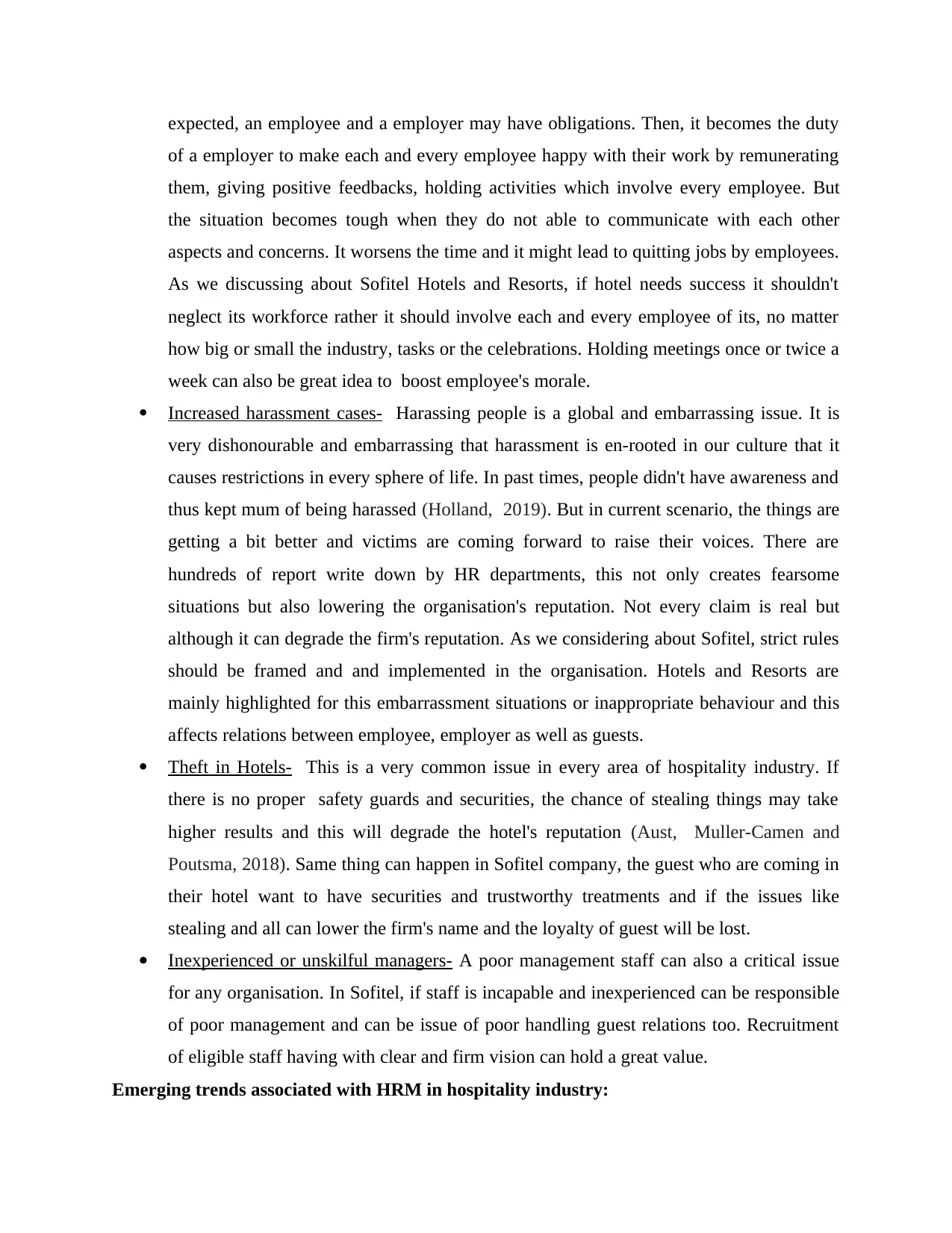
expected, an employee and a employer may have obligations. Then, it becomes the duty
of a employer to make each and every employee happy with their work by remunerating
them, giving positive feedbacks, holding activities which involve every employee. But
the situation becomes tough when they do not able to communicate with each other
aspects and concerns. It worsens the time and it might lead to quitting jobs by employees.
As we discussing about Sofitel Hotels and Resorts, if hotel needs success it shouldn't
neglect its workforce rather it should involve each and every employee of its, no matter
how big or small the industry, tasks or the celebrations. Holding meetings once or twice a
week can also be great idea to boost employee's morale.
Increased harassment cases- Harassing people is a global and embarrassing issue. It is
very dishonourable and embarrassing that harassment is en-rooted in our culture that it
causes restrictions in every sphere of life. In past times, people didn't have awareness and
thus kept mum of being harassed (Holland, 2019). But in current scenario, the things are
getting a bit better and victims are coming forward to raise their voices. There are
hundreds of report write down by HR departments, this not only creates fearsome
situations but also lowering the organisation's reputation. Not every claim is real but
although it can degrade the firm's reputation. As we considering about Sofitel, strict rules
should be framed and and implemented in the organisation. Hotels and Resorts are
mainly highlighted for this embarrassment situations or inappropriate behaviour and this
affects relations between employee, employer as well as guests.
Theft in Hotels- This is a very common issue in every area of hospitality industry. If
there is no proper safety guards and securities, the chance of stealing things may take
higher results and this will degrade the hotel's reputation (Aust, Muller-Camen and
Poutsma, 2018). Same thing can happen in Sofitel company, the guest who are coming in
their hotel want to have securities and trustworthy treatments and if the issues like
stealing and all can lower the firm's name and the loyalty of guest will be lost.
Inexperienced or unskilful managers- A poor management staff can also a critical issue
for any organisation. In Sofitel, if staff is incapable and inexperienced can be responsible
of poor management and can be issue of poor handling guest relations too. Recruitment
of eligible staff having with clear and firm vision can hold a great value.
Emerging trends associated with HRM in hospitality industry:
of a employer to make each and every employee happy with their work by remunerating
them, giving positive feedbacks, holding activities which involve every employee. But
the situation becomes tough when they do not able to communicate with each other
aspects and concerns. It worsens the time and it might lead to quitting jobs by employees.
As we discussing about Sofitel Hotels and Resorts, if hotel needs success it shouldn't
neglect its workforce rather it should involve each and every employee of its, no matter
how big or small the industry, tasks or the celebrations. Holding meetings once or twice a
week can also be great idea to boost employee's morale.
Increased harassment cases- Harassing people is a global and embarrassing issue. It is
very dishonourable and embarrassing that harassment is en-rooted in our culture that it
causes restrictions in every sphere of life. In past times, people didn't have awareness and
thus kept mum of being harassed (Holland, 2019). But in current scenario, the things are
getting a bit better and victims are coming forward to raise their voices. There are
hundreds of report write down by HR departments, this not only creates fearsome
situations but also lowering the organisation's reputation. Not every claim is real but
although it can degrade the firm's reputation. As we considering about Sofitel, strict rules
should be framed and and implemented in the organisation. Hotels and Resorts are
mainly highlighted for this embarrassment situations or inappropriate behaviour and this
affects relations between employee, employer as well as guests.
Theft in Hotels- This is a very common issue in every area of hospitality industry. If
there is no proper safety guards and securities, the chance of stealing things may take
higher results and this will degrade the hotel's reputation (Aust, Muller-Camen and
Poutsma, 2018). Same thing can happen in Sofitel company, the guest who are coming in
their hotel want to have securities and trustworthy treatments and if the issues like
stealing and all can lower the firm's name and the loyalty of guest will be lost.
Inexperienced or unskilful managers- A poor management staff can also a critical issue
for any organisation. In Sofitel, if staff is incapable and inexperienced can be responsible
of poor management and can be issue of poor handling guest relations too. Recruitment
of eligible staff having with clear and firm vision can hold a great value.
Emerging trends associated with HRM in hospitality industry:
Paraphrase This Document
Need a fresh take? Get an instant paraphrase of this document with our AI Paraphraser
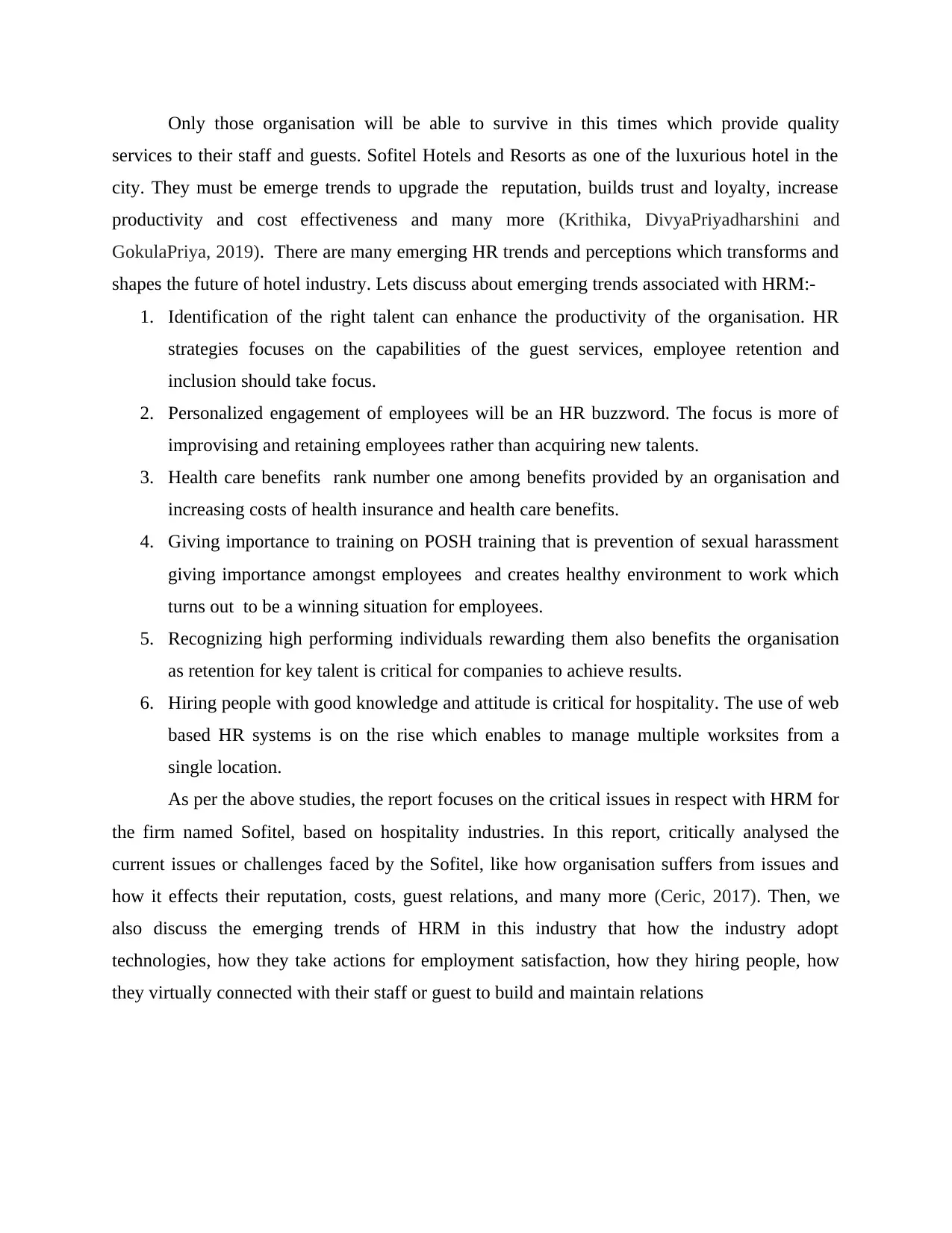
Only those organisation will be able to survive in this times which provide quality
services to their staff and guests. Sofitel Hotels and Resorts as one of the luxurious hotel in the
city. They must be emerge trends to upgrade the reputation, builds trust and loyalty, increase
productivity and cost effectiveness and many more (Krithika, DivyaPriyadharshini and
GokulaPriya, 2019). There are many emerging HR trends and perceptions which transforms and
shapes the future of hotel industry. Lets discuss about emerging trends associated with HRM:-
1. Identification of the right talent can enhance the productivity of the organisation. HR
strategies focuses on the capabilities of the guest services, employee retention and
inclusion should take focus.
2. Personalized engagement of employees will be an HR buzzword. The focus is more of
improvising and retaining employees rather than acquiring new talents.
3. Health care benefits rank number one among benefits provided by an organisation and
increasing costs of health insurance and health care benefits.
4. Giving importance to training on POSH training that is prevention of sexual harassment
giving importance amongst employees and creates healthy environment to work which
turns out to be a winning situation for employees.
5. Recognizing high performing individuals rewarding them also benefits the organisation
as retention for key talent is critical for companies to achieve results.
6. Hiring people with good knowledge and attitude is critical for hospitality. The use of web
based HR systems is on the rise which enables to manage multiple worksites from a
single location.
As per the above studies, the report focuses on the critical issues in respect with HRM for
the firm named Sofitel, based on hospitality industries. In this report, critically analysed the
current issues or challenges faced by the Sofitel, like how organisation suffers from issues and
how it effects their reputation, costs, guest relations, and many more (Ceric, 2017). Then, we
also discuss the emerging trends of HRM in this industry that how the industry adopt
technologies, how they take actions for employment satisfaction, how they hiring people, how
they virtually connected with their staff or guest to build and maintain relations
services to their staff and guests. Sofitel Hotels and Resorts as one of the luxurious hotel in the
city. They must be emerge trends to upgrade the reputation, builds trust and loyalty, increase
productivity and cost effectiveness and many more (Krithika, DivyaPriyadharshini and
GokulaPriya, 2019). There are many emerging HR trends and perceptions which transforms and
shapes the future of hotel industry. Lets discuss about emerging trends associated with HRM:-
1. Identification of the right talent can enhance the productivity of the organisation. HR
strategies focuses on the capabilities of the guest services, employee retention and
inclusion should take focus.
2. Personalized engagement of employees will be an HR buzzword. The focus is more of
improvising and retaining employees rather than acquiring new talents.
3. Health care benefits rank number one among benefits provided by an organisation and
increasing costs of health insurance and health care benefits.
4. Giving importance to training on POSH training that is prevention of sexual harassment
giving importance amongst employees and creates healthy environment to work which
turns out to be a winning situation for employees.
5. Recognizing high performing individuals rewarding them also benefits the organisation
as retention for key talent is critical for companies to achieve results.
6. Hiring people with good knowledge and attitude is critical for hospitality. The use of web
based HR systems is on the rise which enables to manage multiple worksites from a
single location.
As per the above studies, the report focuses on the critical issues in respect with HRM for
the firm named Sofitel, based on hospitality industries. In this report, critically analysed the
current issues or challenges faced by the Sofitel, like how organisation suffers from issues and
how it effects their reputation, costs, guest relations, and many more (Ceric, 2017). Then, we
also discuss the emerging trends of HRM in this industry that how the industry adopt
technologies, how they take actions for employment satisfaction, how they hiring people, how
they virtually connected with their staff or guest to build and maintain relations
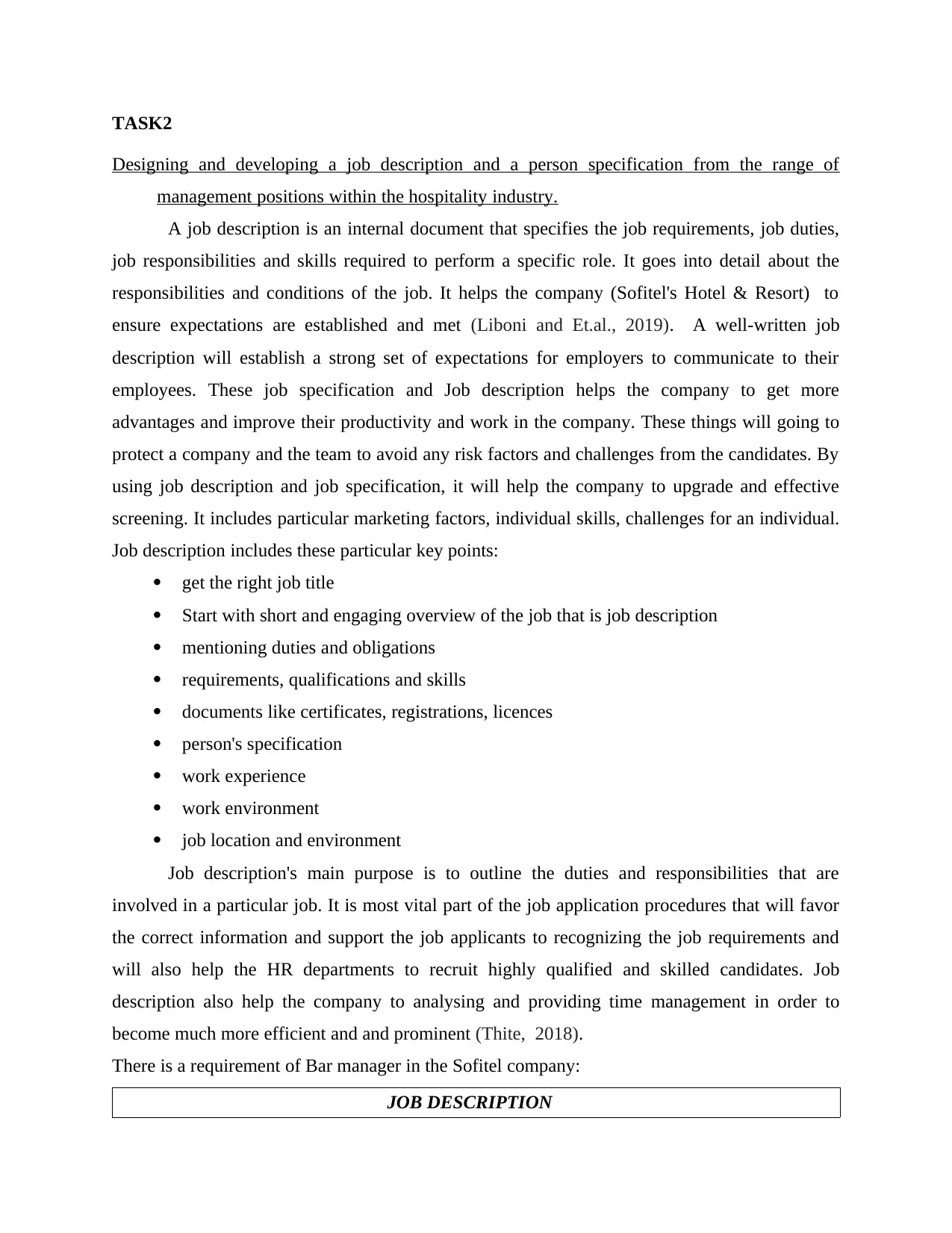
TASK2
Designing and developing a job description and a person specification from the range of
management positions within the hospitality industry.
A job description is an internal document that specifies the job requirements, job duties,
job responsibilities and skills required to perform a specific role. It goes into detail about the
responsibilities and conditions of the job. It helps the company (Sofitel's Hotel & Resort) to
ensure expectations are established and met (Liboni and Et.al., 2019). A well-written job
description will establish a strong set of expectations for employers to communicate to their
employees. These job specification and Job description helps the company to get more
advantages and improve their productivity and work in the company. These things will going to
protect a company and the team to avoid any risk factors and challenges from the candidates. By
using job description and job specification, it will help the company to upgrade and effective
screening. It includes particular marketing factors, individual skills, challenges for an individual.
Job description includes these particular key points:
get the right job title
Start with short and engaging overview of the job that is job description
mentioning duties and obligations
requirements, qualifications and skills
documents like certificates, registrations, licences
person's specification
work experience
work environment
job location and environment
Job description's main purpose is to outline the duties and responsibilities that are
involved in a particular job. It is most vital part of the job application procedures that will favor
the correct information and support the job applicants to recognizing the job requirements and
will also help the HR departments to recruit highly qualified and skilled candidates. Job
description also help the company to analysing and providing time management in order to
become much more efficient and and prominent (Thite, 2018).
There is a requirement of Bar manager in the Sofitel company:
JOB DESCRIPTION
Designing and developing a job description and a person specification from the range of
management positions within the hospitality industry.
A job description is an internal document that specifies the job requirements, job duties,
job responsibilities and skills required to perform a specific role. It goes into detail about the
responsibilities and conditions of the job. It helps the company (Sofitel's Hotel & Resort) to
ensure expectations are established and met (Liboni and Et.al., 2019). A well-written job
description will establish a strong set of expectations for employers to communicate to their
employees. These job specification and Job description helps the company to get more
advantages and improve their productivity and work in the company. These things will going to
protect a company and the team to avoid any risk factors and challenges from the candidates. By
using job description and job specification, it will help the company to upgrade and effective
screening. It includes particular marketing factors, individual skills, challenges for an individual.
Job description includes these particular key points:
get the right job title
Start with short and engaging overview of the job that is job description
mentioning duties and obligations
requirements, qualifications and skills
documents like certificates, registrations, licences
person's specification
work experience
work environment
job location and environment
Job description's main purpose is to outline the duties and responsibilities that are
involved in a particular job. It is most vital part of the job application procedures that will favor
the correct information and support the job applicants to recognizing the job requirements and
will also help the HR departments to recruit highly qualified and skilled candidates. Job
description also help the company to analysing and providing time management in order to
become much more efficient and and prominent (Thite, 2018).
There is a requirement of Bar manager in the Sofitel company:
JOB DESCRIPTION
⊘ This is a preview!⊘
Do you want full access?
Subscribe today to unlock all pages.

Trusted by 1+ million students worldwide
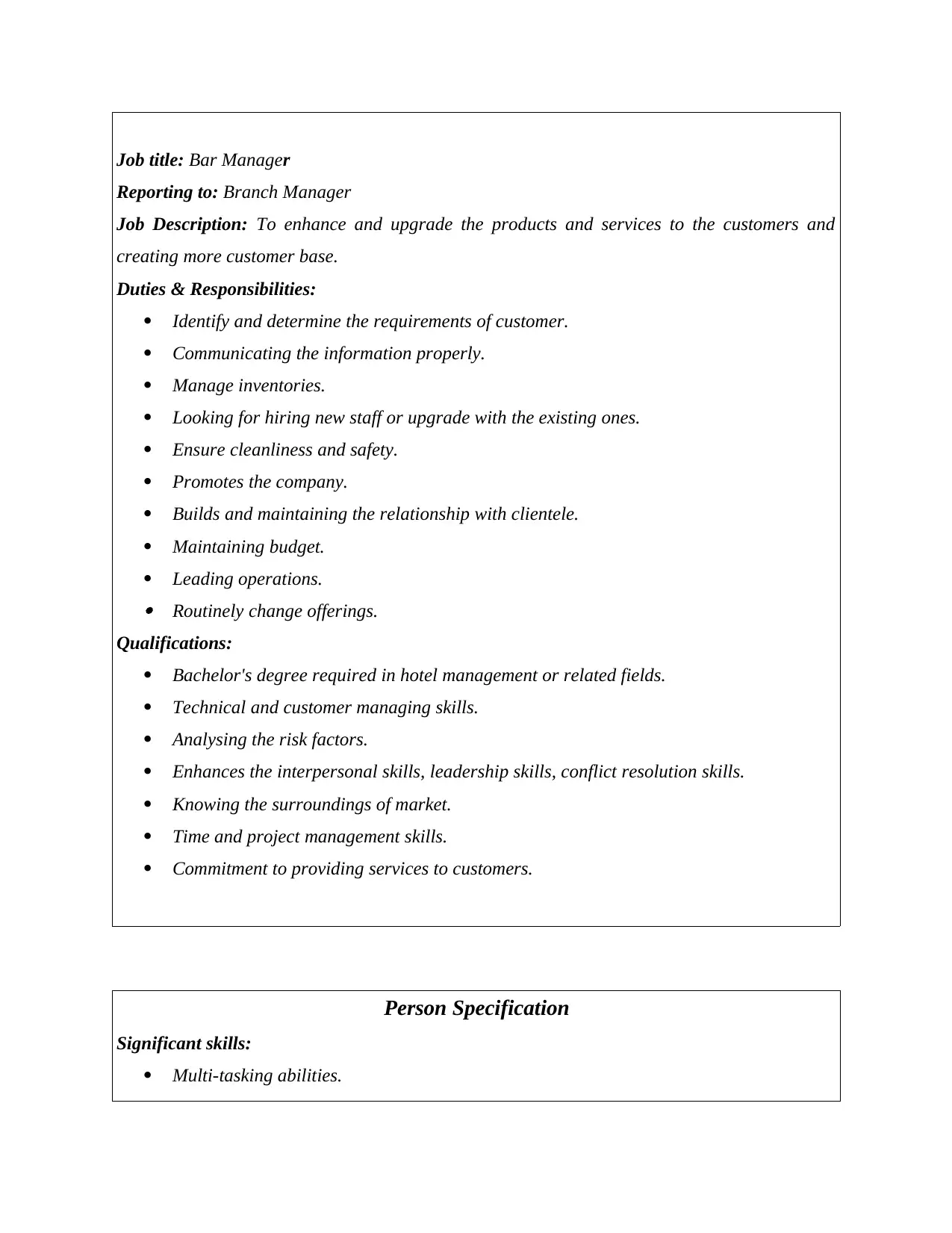
Job title: Bar Manager
Reporting to: Branch Manager
Job Description: To enhance and upgrade the products and services to the customers and
creating more customer base.
Duties & Responsibilities:
Identify and determine the requirements of customer.
Communicating the information properly.
Manage inventories.
Looking for hiring new staff or upgrade with the existing ones.
Ensure cleanliness and safety.
Promotes the company.
Builds and maintaining the relationship with clientele.
Maintaining budget.
Leading operations. Routinely change offerings.
Qualifications:
Bachelor's degree required in hotel management or related fields.
Technical and customer managing skills.
Analysing the risk factors.
Enhances the interpersonal skills, leadership skills, conflict resolution skills.
Knowing the surroundings of market.
Time and project management skills.
Commitment to providing services to customers.
Person Specification
Significant skills:
Multi-tasking abilities.
Reporting to: Branch Manager
Job Description: To enhance and upgrade the products and services to the customers and
creating more customer base.
Duties & Responsibilities:
Identify and determine the requirements of customer.
Communicating the information properly.
Manage inventories.
Looking for hiring new staff or upgrade with the existing ones.
Ensure cleanliness and safety.
Promotes the company.
Builds and maintaining the relationship with clientele.
Maintaining budget.
Leading operations. Routinely change offerings.
Qualifications:
Bachelor's degree required in hotel management or related fields.
Technical and customer managing skills.
Analysing the risk factors.
Enhances the interpersonal skills, leadership skills, conflict resolution skills.
Knowing the surroundings of market.
Time and project management skills.
Commitment to providing services to customers.
Person Specification
Significant skills:
Multi-tasking abilities.
Paraphrase This Document
Need a fresh take? Get an instant paraphrase of this document with our AI Paraphraser
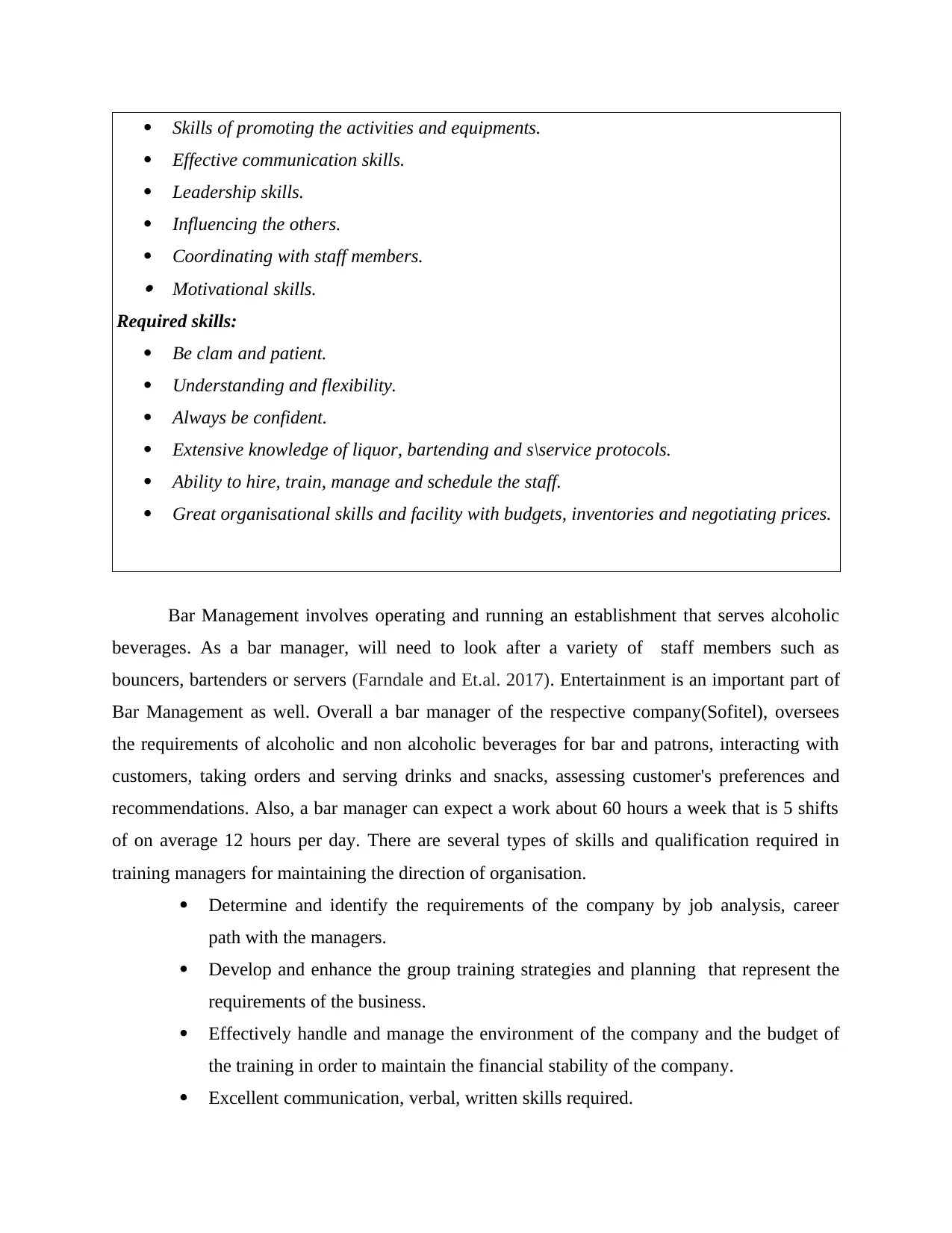
Skills of promoting the activities and equipments.
Effective communication skills.
Leadership skills.
Influencing the others.
Coordinating with staff members. Motivational skills.
Required skills:
Be clam and patient.
Understanding and flexibility.
Always be confident.
Extensive knowledge of liquor, bartending and s\service protocols.
Ability to hire, train, manage and schedule the staff.
Great organisational skills and facility with budgets, inventories and negotiating prices.
Bar Management involves operating and running an establishment that serves alcoholic
beverages. As a bar manager, will need to look after a variety of staff members such as
bouncers, bartenders or servers (Farndale and Et.al. 2017). Entertainment is an important part of
Bar Management as well. Overall a bar manager of the respective company(Sofitel), oversees
the requirements of alcoholic and non alcoholic beverages for bar and patrons, interacting with
customers, taking orders and serving drinks and snacks, assessing customer's preferences and
recommendations. Also, a bar manager can expect a work about 60 hours a week that is 5 shifts
of on average 12 hours per day. There are several types of skills and qualification required in
training managers for maintaining the direction of organisation.
Determine and identify the requirements of the company by job analysis, career
path with the managers.
Develop and enhance the group training strategies and planning that represent the
requirements of the business.
Effectively handle and manage the environment of the company and the budget of
the training in order to maintain the financial stability of the company.
Excellent communication, verbal, written skills required.
Effective communication skills.
Leadership skills.
Influencing the others.
Coordinating with staff members. Motivational skills.
Required skills:
Be clam and patient.
Understanding and flexibility.
Always be confident.
Extensive knowledge of liquor, bartending and s\service protocols.
Ability to hire, train, manage and schedule the staff.
Great organisational skills and facility with budgets, inventories and negotiating prices.
Bar Management involves operating and running an establishment that serves alcoholic
beverages. As a bar manager, will need to look after a variety of staff members such as
bouncers, bartenders or servers (Farndale and Et.al. 2017). Entertainment is an important part of
Bar Management as well. Overall a bar manager of the respective company(Sofitel), oversees
the requirements of alcoholic and non alcoholic beverages for bar and patrons, interacting with
customers, taking orders and serving drinks and snacks, assessing customer's preferences and
recommendations. Also, a bar manager can expect a work about 60 hours a week that is 5 shifts
of on average 12 hours per day. There are several types of skills and qualification required in
training managers for maintaining the direction of organisation.
Determine and identify the requirements of the company by job analysis, career
path with the managers.
Develop and enhance the group training strategies and planning that represent the
requirements of the business.
Effectively handle and manage the environment of the company and the budget of
the training in order to maintain the financial stability of the company.
Excellent communication, verbal, written skills required.
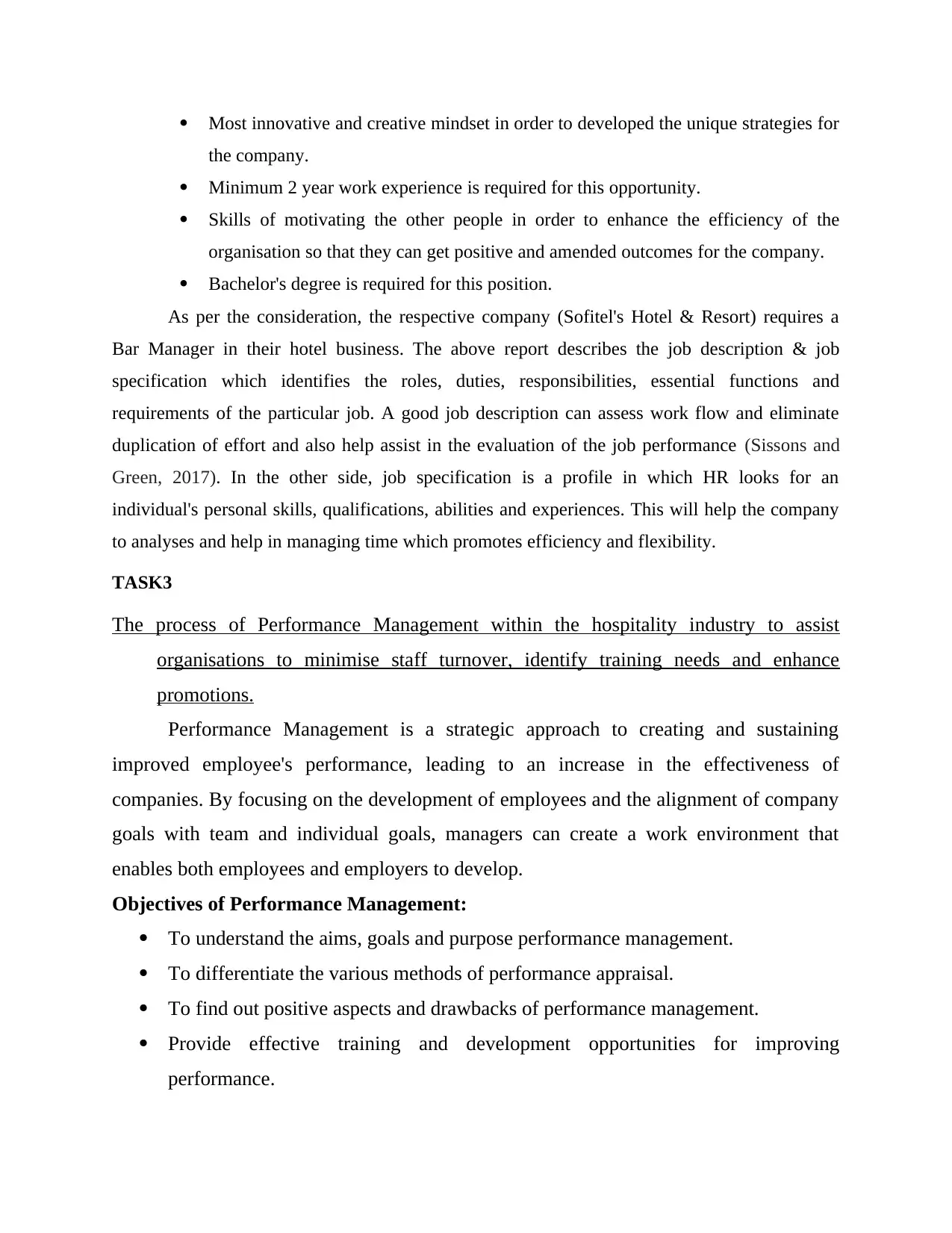
Most innovative and creative mindset in order to developed the unique strategies for
the company.
Minimum 2 year work experience is required for this opportunity.
Skills of motivating the other people in order to enhance the efficiency of the
organisation so that they can get positive and amended outcomes for the company.
Bachelor's degree is required for this position.
As per the consideration, the respective company (Sofitel's Hotel & Resort) requires a
Bar Manager in their hotel business. The above report describes the job description & job
specification which identifies the roles, duties, responsibilities, essential functions and
requirements of the particular job. A good job description can assess work flow and eliminate
duplication of effort and also help assist in the evaluation of the job performance (Sissons and
Green, 2017). In the other side, job specification is a profile in which HR looks for an
individual's personal skills, qualifications, abilities and experiences. This will help the company
to analyses and help in managing time which promotes efficiency and flexibility.
TASK3
The process of Performance Management within the hospitality industry to assist
organisations to minimise staff turnover, identify training needs and enhance
promotions.
Performance Management is a strategic approach to creating and sustaining
improved employee's performance, leading to an increase in the effectiveness of
companies. By focusing on the development of employees and the alignment of company
goals with team and individual goals, managers can create a work environment that
enables both employees and employers to develop.
Objectives of Performance Management:
To understand the aims, goals and purpose performance management.
To differentiate the various methods of performance appraisal.
To find out positive aspects and drawbacks of performance management.
Provide effective training and development opportunities for improving
performance.
the company.
Minimum 2 year work experience is required for this opportunity.
Skills of motivating the other people in order to enhance the efficiency of the
organisation so that they can get positive and amended outcomes for the company.
Bachelor's degree is required for this position.
As per the consideration, the respective company (Sofitel's Hotel & Resort) requires a
Bar Manager in their hotel business. The above report describes the job description & job
specification which identifies the roles, duties, responsibilities, essential functions and
requirements of the particular job. A good job description can assess work flow and eliminate
duplication of effort and also help assist in the evaluation of the job performance (Sissons and
Green, 2017). In the other side, job specification is a profile in which HR looks for an
individual's personal skills, qualifications, abilities and experiences. This will help the company
to analyses and help in managing time which promotes efficiency and flexibility.
TASK3
The process of Performance Management within the hospitality industry to assist
organisations to minimise staff turnover, identify training needs and enhance
promotions.
Performance Management is a strategic approach to creating and sustaining
improved employee's performance, leading to an increase in the effectiveness of
companies. By focusing on the development of employees and the alignment of company
goals with team and individual goals, managers can create a work environment that
enables both employees and employers to develop.
Objectives of Performance Management:
To understand the aims, goals and purpose performance management.
To differentiate the various methods of performance appraisal.
To find out positive aspects and drawbacks of performance management.
Provide effective training and development opportunities for improving
performance.
⊘ This is a preview!⊘
Do you want full access?
Subscribe today to unlock all pages.

Trusted by 1+ million students worldwide
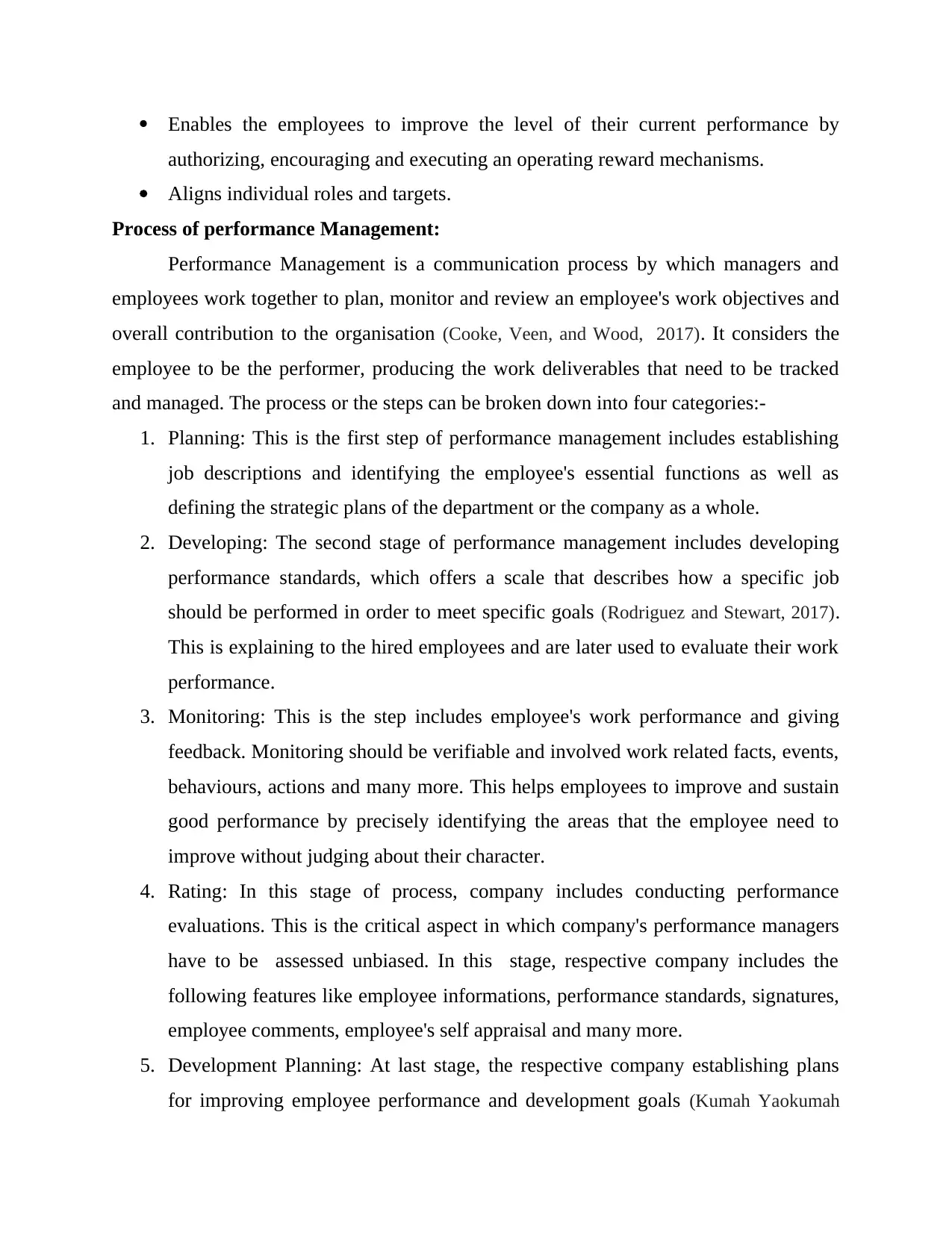
Enables the employees to improve the level of their current performance by
authorizing, encouraging and executing an operating reward mechanisms.
Aligns individual roles and targets.
Process of performance Management:
Performance Management is a communication process by which managers and
employees work together to plan, monitor and review an employee's work objectives and
overall contribution to the organisation (Cooke, Veen, and Wood, 2017). It considers the
employee to be the performer, producing the work deliverables that need to be tracked
and managed. The process or the steps can be broken down into four categories:-
1. Planning: This is the first step of performance management includes establishing
job descriptions and identifying the employee's essential functions as well as
defining the strategic plans of the department or the company as a whole.
2. Developing: The second stage of performance management includes developing
performance standards, which offers a scale that describes how a specific job
should be performed in order to meet specific goals (Rodriguez and Stewart, 2017).
This is explaining to the hired employees and are later used to evaluate their work
performance.
3. Monitoring: This is the step includes employee's work performance and giving
feedback. Monitoring should be verifiable and involved work related facts, events,
behaviours, actions and many more. This helps employees to improve and sustain
good performance by precisely identifying the areas that the employee need to
improve without judging about their character.
4. Rating: In this stage of process, company includes conducting performance
evaluations. This is the critical aspect in which company's performance managers
have to be assessed unbiased. In this stage, respective company includes the
following features like employee informations, performance standards, signatures,
employee comments, employee's self appraisal and many more.
5. Development Planning: At last stage, the respective company establishing plans
for improving employee performance and development goals (Kumah Yaokumah
authorizing, encouraging and executing an operating reward mechanisms.
Aligns individual roles and targets.
Process of performance Management:
Performance Management is a communication process by which managers and
employees work together to plan, monitor and review an employee's work objectives and
overall contribution to the organisation (Cooke, Veen, and Wood, 2017). It considers the
employee to be the performer, producing the work deliverables that need to be tracked
and managed. The process or the steps can be broken down into four categories:-
1. Planning: This is the first step of performance management includes establishing
job descriptions and identifying the employee's essential functions as well as
defining the strategic plans of the department or the company as a whole.
2. Developing: The second stage of performance management includes developing
performance standards, which offers a scale that describes how a specific job
should be performed in order to meet specific goals (Rodriguez and Stewart, 2017).
This is explaining to the hired employees and are later used to evaluate their work
performance.
3. Monitoring: This is the step includes employee's work performance and giving
feedback. Monitoring should be verifiable and involved work related facts, events,
behaviours, actions and many more. This helps employees to improve and sustain
good performance by precisely identifying the areas that the employee need to
improve without judging about their character.
4. Rating: In this stage of process, company includes conducting performance
evaluations. This is the critical aspect in which company's performance managers
have to be assessed unbiased. In this stage, respective company includes the
following features like employee informations, performance standards, signatures,
employee comments, employee's self appraisal and many more.
5. Development Planning: At last stage, the respective company establishing plans
for improving employee performance and development goals (Kumah Yaokumah
Paraphrase This Document
Need a fresh take? Get an instant paraphrase of this document with our AI Paraphraser
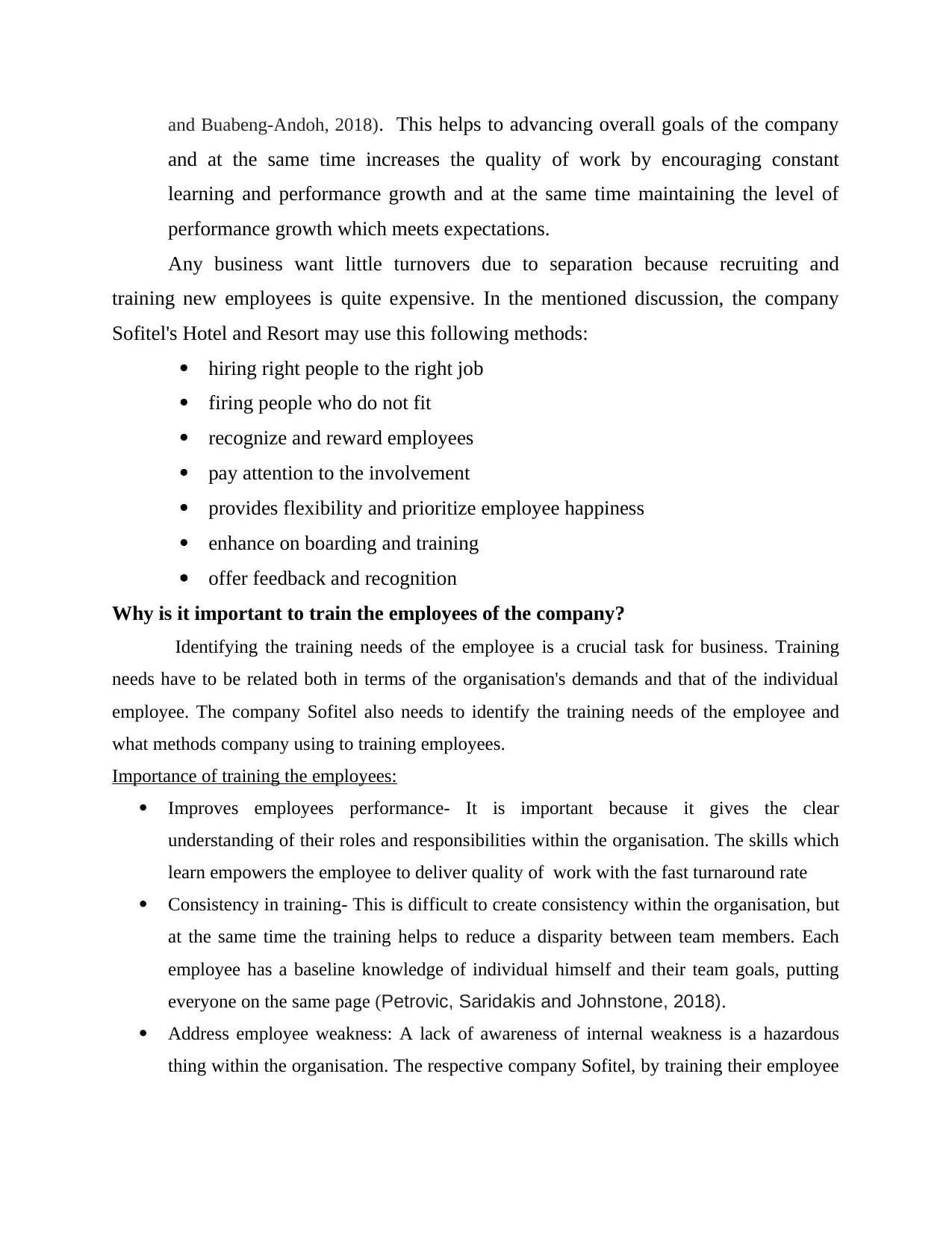
and Buabeng-Andoh, 2018). This helps to advancing overall goals of the company
and at the same time increases the quality of work by encouraging constant
learning and performance growth and at the same time maintaining the level of
performance growth which meets expectations.
Any business want little turnovers due to separation because recruiting and
training new employees is quite expensive. In the mentioned discussion, the company
Sofitel's Hotel and Resort may use this following methods:
hiring right people to the right job
firing people who do not fit
recognize and reward employees
pay attention to the involvement
provides flexibility and prioritize employee happiness
enhance on boarding and training
offer feedback and recognition
Why is it important to train the employees of the company?
Identifying the training needs of the employee is a crucial task for business. Training
needs have to be related both in terms of the organisation's demands and that of the individual
employee. The company Sofitel also needs to identify the training needs of the employee and
what methods company using to training employees.
Importance of training the employees:
Improves employees performance- It is important because it gives the clear
understanding of their roles and responsibilities within the organisation. The skills which
learn empowers the employee to deliver quality of work with the fast turnaround rate
Consistency in training- This is difficult to create consistency within the organisation, but
at the same time the training helps to reduce a disparity between team members. Each
employee has a baseline knowledge of individual himself and their team goals, putting
everyone on the same page (Petrovic, Saridakis and Johnstone, 2018).
Address employee weakness: A lack of awareness of internal weakness is a hazardous
thing within the organisation. The respective company Sofitel, by training their employee
and at the same time increases the quality of work by encouraging constant
learning and performance growth and at the same time maintaining the level of
performance growth which meets expectations.
Any business want little turnovers due to separation because recruiting and
training new employees is quite expensive. In the mentioned discussion, the company
Sofitel's Hotel and Resort may use this following methods:
hiring right people to the right job
firing people who do not fit
recognize and reward employees
pay attention to the involvement
provides flexibility and prioritize employee happiness
enhance on boarding and training
offer feedback and recognition
Why is it important to train the employees of the company?
Identifying the training needs of the employee is a crucial task for business. Training
needs have to be related both in terms of the organisation's demands and that of the individual
employee. The company Sofitel also needs to identify the training needs of the employee and
what methods company using to training employees.
Importance of training the employees:
Improves employees performance- It is important because it gives the clear
understanding of their roles and responsibilities within the organisation. The skills which
learn empowers the employee to deliver quality of work with the fast turnaround rate
Consistency in training- This is difficult to create consistency within the organisation, but
at the same time the training helps to reduce a disparity between team members. Each
employee has a baseline knowledge of individual himself and their team goals, putting
everyone on the same page (Petrovic, Saridakis and Johnstone, 2018).
Address employee weakness: A lack of awareness of internal weakness is a hazardous
thing within the organisation. The respective company Sofitel, by training their employee
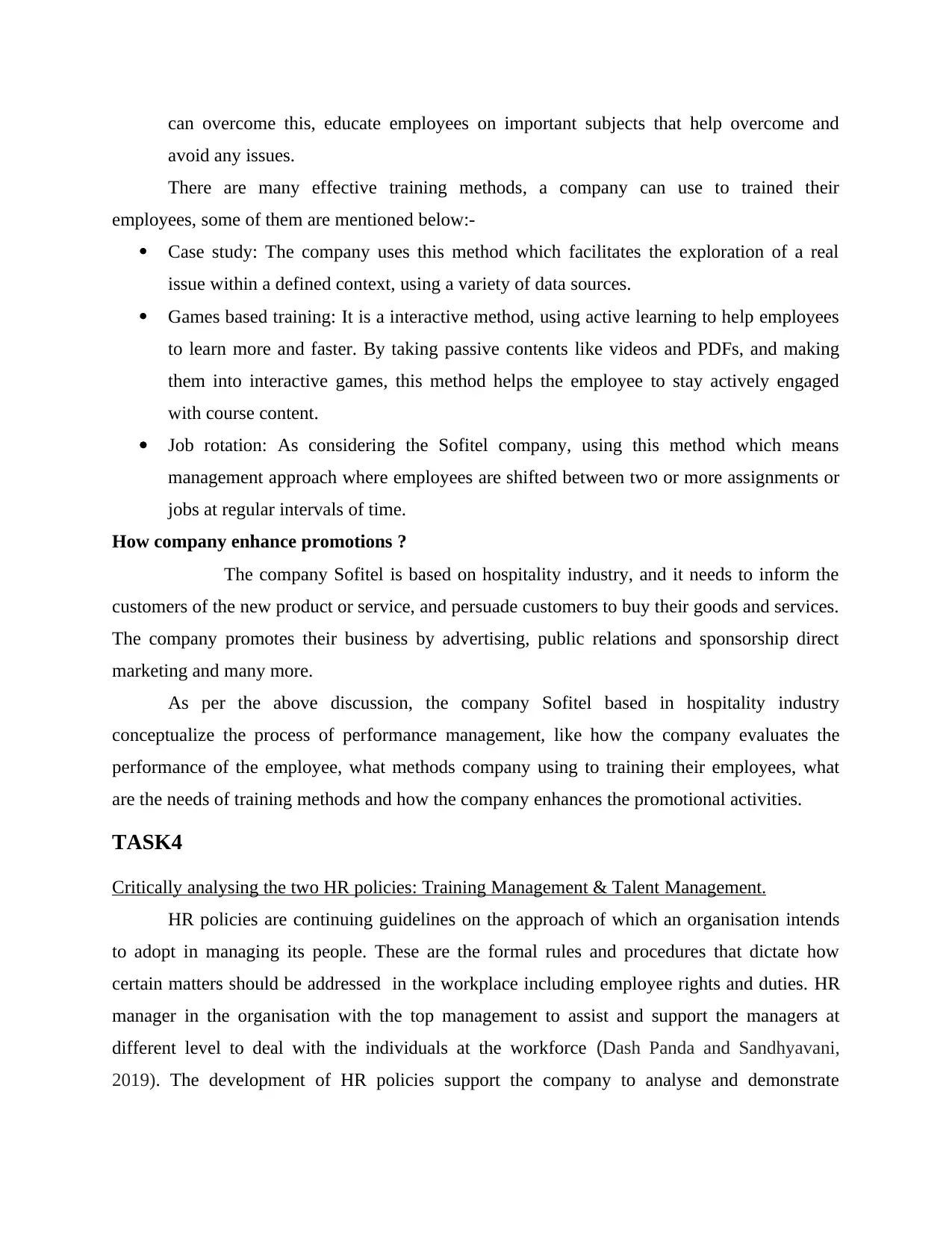
can overcome this, educate employees on important subjects that help overcome and
avoid any issues.
There are many effective training methods, a company can use to trained their
employees, some of them are mentioned below:-
Case study: The company uses this method which facilitates the exploration of a real
issue within a defined context, using a variety of data sources.
Games based training: It is a interactive method, using active learning to help employees
to learn more and faster. By taking passive contents like videos and PDFs, and making
them into interactive games, this method helps the employee to stay actively engaged
with course content.
Job rotation: As considering the Sofitel company, using this method which means
management approach where employees are shifted between two or more assignments or
jobs at regular intervals of time.
How company enhance promotions ?
The company Sofitel is based on hospitality industry, and it needs to inform the
customers of the new product or service, and persuade customers to buy their goods and services.
The company promotes their business by advertising, public relations and sponsorship direct
marketing and many more.
As per the above discussion, the company Sofitel based in hospitality industry
conceptualize the process of performance management, like how the company evaluates the
performance of the employee, what methods company using to training their employees, what
are the needs of training methods and how the company enhances the promotional activities.
TASK4
Critically analysing the two HR policies: Training Management & Talent Management.
HR policies are continuing guidelines on the approach of which an organisation intends
to adopt in managing its people. These are the formal rules and procedures that dictate how
certain matters should be addressed in the workplace including employee rights and duties. HR
manager in the organisation with the top management to assist and support the managers at
different level to deal with the individuals at the workforce (Dash Panda and Sandhyavani,
2019). The development of HR policies support the company to analyse and demonstrate
avoid any issues.
There are many effective training methods, a company can use to trained their
employees, some of them are mentioned below:-
Case study: The company uses this method which facilitates the exploration of a real
issue within a defined context, using a variety of data sources.
Games based training: It is a interactive method, using active learning to help employees
to learn more and faster. By taking passive contents like videos and PDFs, and making
them into interactive games, this method helps the employee to stay actively engaged
with course content.
Job rotation: As considering the Sofitel company, using this method which means
management approach where employees are shifted between two or more assignments or
jobs at regular intervals of time.
How company enhance promotions ?
The company Sofitel is based on hospitality industry, and it needs to inform the
customers of the new product or service, and persuade customers to buy their goods and services.
The company promotes their business by advertising, public relations and sponsorship direct
marketing and many more.
As per the above discussion, the company Sofitel based in hospitality industry
conceptualize the process of performance management, like how the company evaluates the
performance of the employee, what methods company using to training their employees, what
are the needs of training methods and how the company enhances the promotional activities.
TASK4
Critically analysing the two HR policies: Training Management & Talent Management.
HR policies are continuing guidelines on the approach of which an organisation intends
to adopt in managing its people. These are the formal rules and procedures that dictate how
certain matters should be addressed in the workplace including employee rights and duties. HR
manager in the organisation with the top management to assist and support the managers at
different level to deal with the individuals at the workforce (Dash Panda and Sandhyavani,
2019). The development of HR policies support the company to analyse and demonstrate
⊘ This is a preview!⊘
Do you want full access?
Subscribe today to unlock all pages.

Trusted by 1+ million students worldwide
1 out of 18
Related Documents
Your All-in-One AI-Powered Toolkit for Academic Success.
+13062052269
info@desklib.com
Available 24*7 on WhatsApp / Email
![[object Object]](/_next/static/media/star-bottom.7253800d.svg)
Unlock your academic potential
Copyright © 2020–2026 A2Z Services. All Rights Reserved. Developed and managed by ZUCOL.





